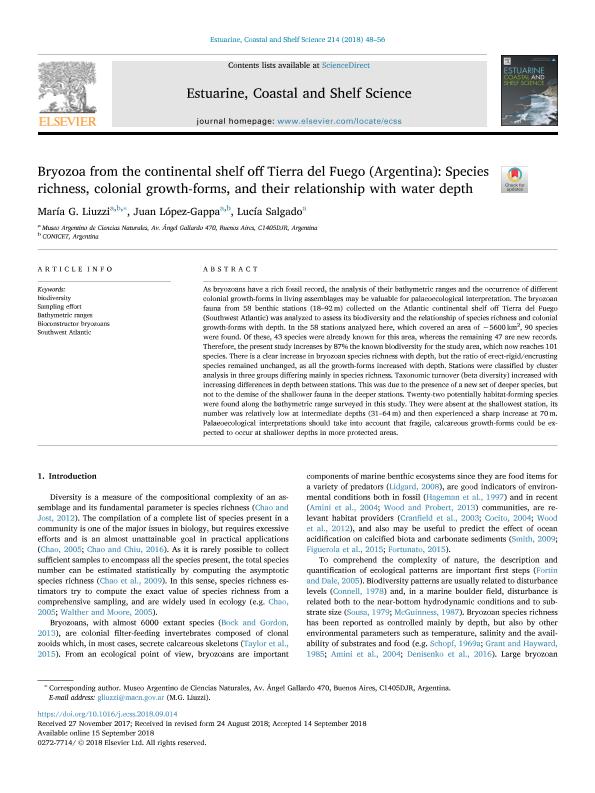Mostrar el registro sencillo del ítem
dc.contributor.author
Liuzzi, Maria Gabriela

dc.contributor.author
López Gappa, Juan José

dc.contributor.author
Salgado, Lucía
dc.date.available
2020-01-15T20:55:30Z
dc.date.issued
2018-12
dc.identifier.citation
Liuzzi, Maria Gabriela; López Gappa, Juan José; Salgado, Lucía; Bryozoa from the continental shelf off Tierra del Fuego (Argentina): Species richness, colonial growth-forms, and their relationship with water depth; Academic Press Ltd - Elsevier Science Ltd; Estuarine, Coastal and Shelf Science; 214; 12-2018; 48-56
dc.identifier.issn
0272-7714
dc.identifier.uri
http://hdl.handle.net/11336/94851
dc.description.abstract
As bryozoans have a rich fossil record, the analysis of their bathymetric ranges and the occurrence of different colonial growth-forms in living assemblages may be valuable for palaeoecological interpretation. The bryozoan fauna from 58 benthic stations (18–92 m) collected on the Atlantic continental shelf off Tierra del Fuego (Southwest Atlantic) was analyzed to assess its biodiversity and the relationship of species richness and colonial growth-forms with depth. In the 58 stations analyzed here, which covered an area of ∼5600 km2, 90 species were found. Of these, 43 species were already known for this area, whereas the remaining 47 are new records. Therefore, the present study increases by 87% the known biodiversity for the study area, which now reaches 101 species. There is a clear increase in bryozoan species richness with depth, but the ratio of erect-rigid/encrusting species remained unchanged, as all the growth-forms increased with depth. Stations were classified by cluster analysis in three groups differing mainly in species richness. Taxonomic turnover (beta diversity) increased with increasing differences in depth between stations. This was due to the presence of a new set of deeper species, but not to the demise of the shallower fauna in the deeper stations. Twenty-two potentially habitat-forming species were found along the bathymetric range surveyed in this study. They were absent at the shallowest station, its number was relatively low at intermediate depths (31–64 m) and then experienced a sharp increase at 70 m. Palaeoecological interpretations should take into account that fragile, calcareous growth-forms could be expected to occur at shallower depths in more protected areas.
dc.format
application/pdf
dc.language.iso
eng
dc.publisher
Academic Press Ltd - Elsevier Science Ltd

dc.rights
info:eu-repo/semantics/openAccess
dc.rights.uri
https://creativecommons.org/licenses/by-nc-sa/2.5/ar/
dc.subject
BIODIVERSITY
dc.subject
SAMPLING EFFORT
dc.subject
BATHYMETRIC RANGES
dc.subject
BIOCONSTRUCTOR BRYOZOANS
dc.subject
SOUTHWEST ATLANTIC
dc.subject.classification
Ecología

dc.subject.classification
Ciencias Biológicas

dc.subject.classification
CIENCIAS NATURALES Y EXACTAS

dc.subject.classification
Biología Marina, Limnología

dc.subject.classification
Ciencias Biológicas

dc.subject.classification
CIENCIAS NATURALES Y EXACTAS

dc.title
Bryozoa from the continental shelf off Tierra del Fuego (Argentina): Species richness, colonial growth-forms, and their relationship with water depth
dc.type
info:eu-repo/semantics/article
dc.type
info:ar-repo/semantics/artículo
dc.type
info:eu-repo/semantics/publishedVersion
dc.date.updated
2019-10-16T19:28:38Z
dc.journal.volume
214
dc.journal.pagination
48-56
dc.journal.pais
Estados Unidos

dc.journal.ciudad
Amsterdam
dc.description.fil
Fil: Liuzzi, Maria Gabriela. Consejo Nacional de Investigaciones Científicas y Técnicas. Oficina de Coordinación Administrativa Parque Centenario. Museo Argentino de Ciencias Naturales “Bernardino Rivadavia”; Argentina
dc.description.fil
Fil: López Gappa, Juan José. Consejo Nacional de Investigaciones Científicas y Técnicas. Oficina de Coordinación Administrativa Parque Centenario. Museo Argentino de Ciencias Naturales “Bernardino Rivadavia”; Argentina
dc.description.fil
Fil: Salgado, Lucía. Consejo Nacional de Investigaciones Científicas y Técnicas. Oficina de Coordinación Administrativa Parque Centenario. Museo Argentino de Ciencias Naturales “Bernardino Rivadavia”; Argentina
dc.journal.title
Estuarine, Coastal and Shelf Science

dc.relation.alternativeid
info:eu-repo/semantics/altIdentifier/url/https://www.sciencedirect.com/science/article/pii/S0272771417311204
dc.relation.alternativeid
info:eu-repo/semantics/altIdentifier/doi/http://dx.doi.org/10.1016/j.ecss.2018.09.014
Archivos asociados
